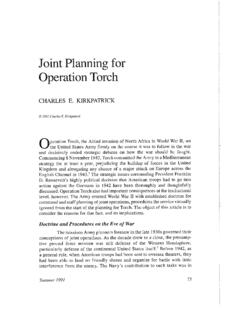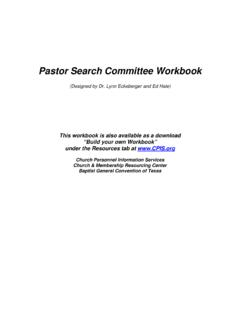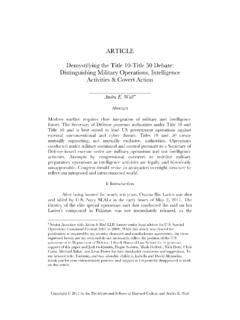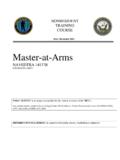Transcription of PROMOTING FREE AND FAIR ELECTIONS IN AFRICA: THE …
1 PROMOTING free AND fair ELECTIONS IN AFRICA: THE ROLE OF THE. undp AND other international PARTNERS. Joram Kumaaipurua Rukambe1. Introduction The year 2010 has been dubbed the biggest election year in Africa given the quite unprecedented high number of countries on the continent having ELECTIONS and the increasingly higher population of Africans ready to vote this year. African ELECTIONS have become more robust and competitive, yet in the same vein, they are increasingly challenging given the increasing level of sophistication in their rigging and manipulation especially in some countries. This is a challenge for the majority of African voters who want to hold their leaders accountable through ELECTIONS and also want their elected leaders to translate election promises into public policies which engender democratic governance and development. Similarly, international development partners, UN agencies included, regard credible ELECTIONS as a key avenue for citizens to exercise their democratic right on how and who should rule over them.
2 They further regard competitive ELECTIONS as critical for PROMOTING socio-economic policies which are responsive to people's needs and aspirations and which aim at eradicating poverty and expanding the choices that all people have in their lives. This presentation will attempt to highlight the achievements and challenges of ELECTIONS in Africa, explain why ELECTIONS in Africa remain problematic, and how the international community and local actors can work together to democratise and enhance the credibility of ELECTIONS on the continent. The presentation will address role of the UN in PROMOTING credible ELECTIONS and will also unpack some of the undp electoral support activities, those of others and also those the undp is 1. Joram Rukambe is the Regional Electoral Advisor at the undp Regional Service Centre for Eastern and Southern Africa. He is based in Johannesburg, South Africa.
3 Email: 1. Page undertaking in partnership with national and regional actors in Africa. The presentation will further seek to flag some good practices and principles in PROMOTING international cooperation to support free and fair ELECTIONS . Similarly, the presentation will address some not-so-good practices which international development partners should eschew at all cost in order to ensure that electoral support contributes to democratic consolidation. Context Africa has over the last few decades seen good and bad ELECTIONS which have put different African countries on different trajectories in terms of the quality of development, democracy and governance. A significant number of ELECTIONS have produced good results and place several countries on a firm path of recovery and peaceful transition following years of civil conflicts: these include ELECTIONS in Namibia which led to independence in 1989; South Africa and Mozambique in 1994.
4 To end decades of civil conflict; Sierra Leone and Liberia in the 2000s. Countries such as Ghana and Mauritius have had successful successive ELECTIONS leading to peaceful alternation of power, even more than once. Yet on the other hand Africa has seen ELECTIONS in a host of other countries which have stalled democracy and precipitated political instability: Ivory Coast in 1999, Kenya in 2007 and Zimbabwe in 2008. Why are ELECTIONS problematic in some African countries? ELECTIONS in some countries in Africa have remained problematic and some reasons account for this situation. ELECTIONS in most African countries, just like in other fledgling democracies, take place in a high-stake environment, an environment in which winning an election is tantamount to capturing the state and monopolizing 2. Page access to its resources (jobs, tenders, etc). This is a zero-sum game in which the winner takes all and the looser looses all , meaning the latter will have to contend with five long years of drought without access to the means of survival which can only be dispersed by the state.
5 The weak private sector and concomitant limited economic activities in most African countries makes the state the only employer, producer and distributor of economic goods and opportunities, and hence winning ELECTIONS gives the winner unfettered access to state resources which are in turn used to entrench and perpetuate one's rule. Such resources include state institutions (including the media, security forces, election management bodies, parliament and the judiciary), laws, and also financial, material, and human resources which are mobilized to preserve the incumbent from being dislodged from power. The use of violence and intimidation has also become a common feature in African ELECTIONS and this is used by both opposition and ruling party leaders and supporters to advance their chances to win ELECTIONS . Ethnic and religious cleavages have also been mobilized as a basis for electioneering and these have had catastrophic consequences in several countries, Kenya and Nigeria.
6 The UN history in Electoral Support in brief PROMOTING democracy and ELECTIONS lies at the heart of the mandate and role of the United Nations in general and the undp in particular. It is important to note that while the UN Charter does not directly accord the UN with a mandate to promote democracy in fact democracy is not a pre-condition for UN membership the link between democracy, on the one hand, and other stated purposes of the UN such as PROMOTING peace, human rights, and development, made it imperative for the UN to mainstream democracy promotion in its work. For example, Newman and Rich (2004) argues that democracy is a critical precondition for ending scourge of wars ;. democracy including the right to self-determination and choosing own socio-cultural and political institutions including the government is a fundamental human right; the quality of development on the other hand depends on the quality of democracy.
7 Put differently, there is interdependence between peace, development, human rights and democracy. Beside the UN Charter being silent on democracy promotion, a host of 3. Page subsequent UN decisions and resolutions over the years have given the UN systems a clear mandate to support democracy in general and ELECTIONS in particular. These include the 1948 Declaration of Human Rights2 and the 1966 international Convention for Civil and Political Rights3, both of which provide for the right of citizens to establish democratic systems and institutions through genuine ELECTIONS . Rich and Newman argue that the UN General Assembly has over the years advocated that the authority to govern should stem from the will of the people and that will required an electoral process that provides all citizens with equal opportunity to vote and be voted for and to freely express their political views.
8 In 1991, the General Assembly passed the Resolution 46/137 which gave further clarity to the UN's role in PROMOTING democracy and ELECTIONS . This resolution set up processes and institutions to undertake international electoral assistance on behalf of the UN. These included the Secretary-General's designation of the Under- Secretary-General for Political Affairs as the focal point on electoral matters, the establishment of the United Nations Electoral Assistance Unit in 1992 to support the focal point's efforts. In 1994, the unit became a part of the UN's Department of Political Affairs and was renamed Electoral Assistance Division (EAD). Furthermore, the UNEAD and the undp recently adopted Note of Guidance on UN. Electoral Assistance which is a normative and operational framework for UN support towards the efforts of member states to promote democratic electoral processes and build sustainable capacity to manage electoral systems and processes.
9 In this context, the UN regularly renders technical advice and assistance on the legal, institutional, technical and administrative aspects of organizing and conducting ELECTIONS . It also supports the international or domestic observation of electoral processes in member states. 2. The will of the people, as expressed through genuine and period ELECTIONS (inserted), shall be basis of the authority of the government Article 21(3) . 3. 4. To vote and to be elected at genuine periodic ELECTIONS which shall be by universal and equal suffrage and Page shall be held by secret ballot, guaranteeing the free expression of the will of the electors Article 25(b). The UN history in supporting democratic transition including the promotion of credible ELECTIONS is chequered and varies in terms of the degree of involvement and level of success. One of the first UN engagements in supporting transition mainly in the context of the decolonization of Africa - was Congo in 1960.
10 The UN deployed military forces to restore order in the country and suppress the rebellion which threatened the wellbeing of the newly-independent state. According to Dobbins et al (2005) democracy did figure heavily in the various UN resolutions on Congo4; in fact, there was no agreement during the Cold War on the definition of democracy. This meant that most UN interventions in PROMOTING peaceful and stable states around the world did not include the objective of PROMOTING democracy and good governance as it is the case today following the collapse of the Cold War. Post-Cold War UN-led operations in countries such as Namibia, Cambodia, and Mozambique followed a different trajectory, brokering a peace according; disarmament'; demobilization;. reintegration; encouraging political reconciliation; holding democratic ELECTIONS ; and overseeing the inauguration of a new national government.
















